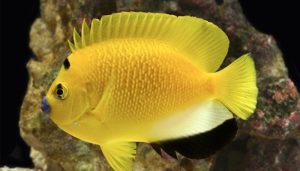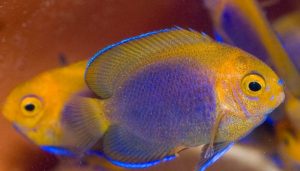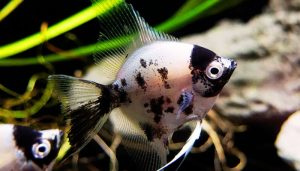Congratulations on having a pregnant guppy in your aquarium! The anticipation of new life is always exciting for any aquarist. However, it can be concerning if your pregnant guppy not giving birth as expected.
If you’re a fish owner, you know the excitement of waiting for your pregnant guppy to give birth.
But what to do when your guppy pregnant but not giving birth? It can be frustrating and concerning to see your fish carrying babies for an extended period without giving birth.
This is a common problem among guppy owners, and several factors can cause it.
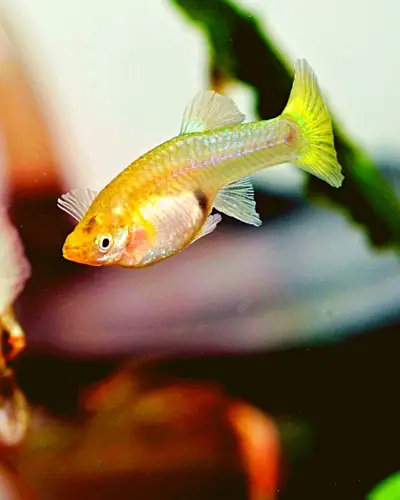
In this ultimate article, we will explore the possible reasons why your pregnant guppy fish may not be giving birth, and we’ll offer quick help and solutions to ensure the well-being of your fish.
Don’t let the disappointment of an uneventful birthing experience ruin your joy of fishkeeping. Keep reading to find out how to solve this problem and ensure the health and happiness of your guppies.
Table of Contents
ToggleUnderstanding Guppy Pregnancy
Before we dive into the reasons for a female guppy not giving birth, let’s first understand the basics of guppy pregnancy. Guppies are livebearers, meaning they will give birth to live fry rather than laying eggs.
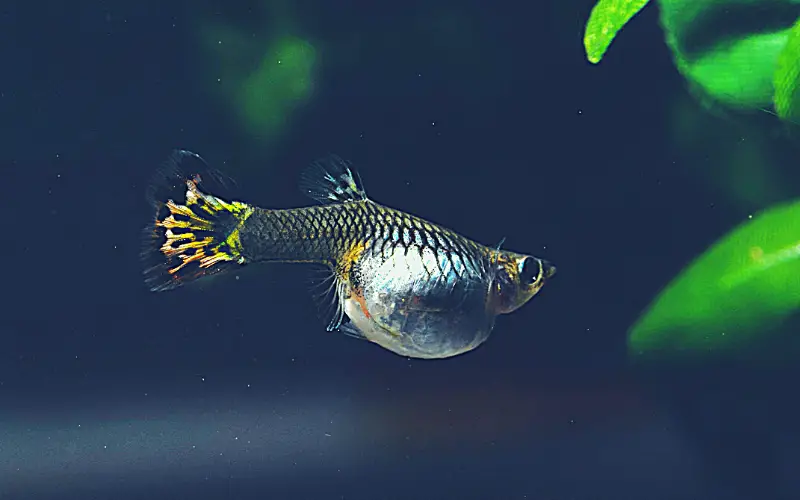
The female guppy carries the developing fry internally, and the gestation period typically lasts between 21 to 31 days. During this time, the female’s abdomen gradually enlarges as the fry grows.
Why Is My Female Pregnant Guppy Not Giving Birth?
why is my pregnant guppy not giving birth? As an aquarist, there could be several reasons your guppy is pregnant but not giving birth to its fry.
Female guppies have a gestation period of 21 to 30 days, and it is not uncommon for them to refuse to give birth within this time frame. Sometimes, they may even extend their gestation period to improve the chances of survival for their fry.
3 Causes of a Pregnant Guppy Not Giving Birth
1. Stress due to Poor Water Conditions
One of the most common reasons pregnant guppies don’t giving birth is stress caused by poor water conditions. Guppies are sensitive to changes in tank water quality, and high levels of ammonia, nitrite, and nitrate can harm their health. High stress levels can lead to delayed birthing or refusal to give birth.
2. Health Issues and Infections
Health issues and infections can also be a contributing factor. If your guppy is sick, it may delay giving birth as a protective measure. Look out for symptoms of illness, such as lethargy, loss of appetite, or abnormal behavior. Common health issues in guppies include constipation, bleeding gills, and other infections.
3. Extended Gestation Period
Sometimes, guppies may naturally extend their gestation period to boost the chances of their fry surviving in the wild. This behavior is more common in the presence of predators or unfavorable conditions. However, it cannot be evident for the aquarist in a controlled aquarium environment.
Help a Pregnant Guppy Quick
Guppy looks pregnant but not giving birth: Here’s what to do If your pregnant guppy is not giving birth
– Improving Water Conditions
It is essential to regularly test and maintain the water tank parameters to address poor water conditions. Ensure that the nitrite, ph, and ammonia levels are at zero and nitrate levels are kept low. Perform regular water changes and invest in a good filtration system to keep the water clean and healthy for your fish.
– Providing Proper Care for Pregnant Guppies
Proper care for pregnant guppies is crucial for their well-being and successful birthing. Offer a high-quality diet rich in nutrients to support the development of the fry. Feeding your guppy small meals multiple times daily to prevent overfeeding and excess waste in the guppy tank.
– Temperature Adjustment
Raising the temperature slightly (around 82 degrees Fahrenheit) can help stimulate labor in pregnant guppies. However, ensure that the temperature increases gradually to avoid stressing the fish.
How To Know When Guppies Will Give Birth?
Female guppies are known for their ability to give birth to live young, making it an exciting time for fish enthusiasts. Understanding when a guppy is ready to give birth is essential to ensure a smooth process.
One of the telltale signs that a female guppy is about to give birth is a noticeably enlarged abdomen. This happens because the guppies are carrying babies inside them. Another indicator is a dark triangular spot called a gravid spot.
As the gestation period nears its end, this spot becomes more prominent. Additionally, a pregnant guppy may change behavior, becoming less active or seeking secluded spots in the aquarium. Overall, closely monitoring the physical appearance and behavior of the female guppy is crucial in determining when she is about to give birth.
What Signs Indicate a Guppy Is Done Giving Birth?
When a guppy is done giving birth, there are a few signs to look out for. Firstly, the female guppy may become less active and less interested in food. This is because giving birth can be physically taxing and exhausting for her.
Additionally, the guppy’s belly will start to look smaller and less distended as the baby guppies, also known as fry, are no longer present. If you observe a sudden decrease in the female guppy’s size, it could indicate that she has given birth.
Another telltale sign is the absence of a gravid spot, the dark patch near the anal fin that means pregnancy in livebearers. This spot will fade away once the female guppy is no longer pregnant.
Furthermore, the behavior of the male guppy can also provide clues. If he starts showing less interest in the female and stops chasing her, it indicates that she has given birth.
How Long Does a Guppy Need to Give Birth?
Guppies are live-bearing fish, meaning they give birth to live young instead of laying eggs. The gestation period for a guppy is typically around 4 weeks, although it can vary by a few days depending on the individual fish and environmental conditions.
When a female guppy is ready to give birth, she will display some physical signs such as a swollen abdomen, a darkened gravid spot (located near the anal fin), and increased activity near the bottom of the tank. When she starts to give birth, she will release tiny guppy fry one at a time, which will quickly begin swimming and trying to find shelter.
The entire process of giving birth to a guppy can take anywhere from a few hours to 28 days, depending on the size of the brood and the individual fish.
It is essential to provide plenty of hiding spaces in the tank for the guppy fry to avoid being eaten by other fish or sucked into the filter. Additionally, it is recommended to separate the pregnant guppy from other fish in the tank to prevent stress and potential harm to the fry.
The Bottom Line of Helping a Pregnant Guppy Not Giving Birth?
If you have a pregnant guppy who is not giving birth, you can take a few steps to help the situation. Here’s the bottom line on how to assist a pregnant guppy:
- Observe and Confirm Pregnancy: First, ensure the guppy is pregnant. Pregnant guppies have a visibly enlarged abdomen, and you may notice a dark gravid spot near the anal fin. They also become more rounded and may display a boxy appearance.
- Provide Adequate Environment: Ensure the pregnant guppy is in a well-maintained tank with clean and adequately conditioned water. Guppies prefer alkaline water with a pH range between 7.0 and 8.5. Regular tank water changes are essential to maintain good water quality.
- Ideal Water Temperature: Maintain the water temperature within the range of 75°F to 82°F (24°C to 28°C). Guppies are tropical fish species and require warm water for optimal health and reproduction.
- Nesting Spots: Add floating plants or artificial spawning mops to the tank. These will serve as safe and comfortable places for the pregnant guppy to give birth and for the fry to hide.
- Patience: Guppies can hold their fry for several days, and it’s not uncommon for first-time mothers to delay giving birth. Sometimes they might wait for more favorable conditions or when they feel safer. Be patient and let nature take its course if the guppy seems healthy and comfortable.
- Separate Tanks: If you suspect the pregnant guppy is stressed or harassed by other tank mates, consider moving her to a different breeding or birthing tank. This will provide a more controlled and peaceful environment for her to give birth.
- Observe Behavior: Watch for signs of distress, such as excessive hiding, erratic swimming, or visible injuries. Stress can prevent guppies from giving birth. If you see any issues, take immediate action to address the problem.
- Consider Professional Help: If you’ve tried all the above steps and the guppy is still not giving birth, or if she shows signs of illness, consult a veterinarian or an experienced fish breeder for further advice and assistance.
- Don’t Force Abortion: You should not attempt to force an abortion. This can be extremely harmful to the mother guppy and may lead to severe health complications.
- Separate the Fry: Once the guppy gives birth, consider separating the fry from the adult fish to increase their chances of survival. Guppy adults may eat their fry, so keeping them in a separate nursery tank with appropriate care will give them a better opportunity to grow and thrive.
Creating a stress-free tank environment for pregnant fish is crucial to encourage successful birthing. Be patient and vigilant; with proper care, your guppy should give birth when ready.
Commonly Asked Questions about Guppy Give Birth (FAQs)
How long does it take for a pregnant guppy to give birth?
The gestation period for a pregnant guppy typically lasts between 21 to 31 days.
Can stress cause a pregnant guppy not to give birth?
Yes, stress, mainly due to poor water conditions, can cause a pregnant guppy to delay or refuse to give birth.
Can guppies become pregnant again immediately after giving birth?
Yes, guppies are capable of becoming pregnant again shortly after giving birth. They are known for their rapid reproductive capabilities.
Should I separate the fry from the adult guppies?
It is advisable to separate the fry from the adult guppies to prevent them from being eaten. You can use a breeder box or a separate tank for the fry.
How do I identify if my guppy is sick?
Look for symptoms of illness such as lethargy, loss of appetite, abnormal behavior, or physical symptoms like bleeding gills.
Can stress in guppies cause constipation?
Yes, stress in guppies can lead to constipation, which further contributes to their discomfort.
How can I tell if my guppy is pregnant?
Female pregnant guppies have a dark gravid spot near the anal fin when pregnant. This spot will gradually darken as the pregnancy progresses.
Should I separate the pregnant guppy into another tank?
Setting up a separate tank for your pregnant guppy is generally a good idea. This tank should be smaller and equipped with hiding spots like plants or decorations. Separating the pregnant guppy helps to reduce stress from other tankmates and provides a safe environment for giving birth.
How long does it take for a guppy to give birth?
The gestation period of a guppy is typically around 4 weeks. However, there can be variations in individual guppies, and some may give birth earlier or later than this timeframe.
My guppy is already pregnant; can it still get pregnant again?
Yes, a female guppy can store sperm from a previous mating and become pregnant even before giving birth to the current batch of fry. This is known as being “double pregnant.”
What can cause a guppy to stress and not give birth?
Why are my pregnant guppies not giving birth? Several factors can cause stress in guppies, leading to the delay or retention of fry. Poor water quality, fluctuations in temperature or pH levels, overcrowding, aggressive tankmates, and other stressful conditions can all affect the ability of a guppy to give birth.
What should I do if my pregnant guppy is sick?
If your pregnant guppy shows signs of illness, it is crucial to address the health issue promptly. Quarantine the sick guppy in a separate tank, treat the disease appropriately, and monitor its condition closely. A sick guppy may not give birth until it has recovered.
Can guppies die while giving birth?
Yes, guppies can die while giving birth. Giving birth can be physically exhausting for the female, especially if it is her first time. Providing a stress-free environment, optimal water conditions, and varied nutrition can help minimize the risk of complications during birth.
Can stress cause a guppy to remain pregnant?
Yes, stress can cause a guppy to retain the fry and delay giving birth. Various factors, including poor water quality, aggressive tankmates, overcrowding, and fluctuations in water parameters, can cause stress. Creating a calm environment for your guppies is essential to prevent stress-related issues.
How can I ensure the water conditions suit my pregnant guppy?
Regularly test the water parameters to ensure optimal water conditions for a pregnant guppy. Ensure the tank is cycled and maintains stable ammonia, nitrite, and nitrate levels. Additionally, provide a well-maintained filtration system and perform regular water tank changes to keep the water clean and safe.
Conclusion
In conclusion, a pregnant guppy not giving birth can cause concern, but it’s a common problem among fish owners. By understanding the three most common reasons why this happens and implementing our expert tips and solutions, you can help ensure the health and happiness of your guppies. Remember to keep a close eye on your pregnant guppy, provide a suitable environment, and avoid stress as much as possible. With patience and care, your pregnant guppy will eventually give birth, and you’ll enjoy the beauty of new life in your aquarium. Don’t let frustration ruin your joy of fishkeeping – stay informed, stay proactive, and always be ready to provide the best care for your beloved aquatic pets.
You might also like
- Guppy Poop Hanging: Reasons, Prevention & Best Solution!
- Do Female Guppies Give Birth All at Once: Shocking Myths Busted!
- When to Isolate Pregnant Guppy: (A Comprehensive Guide)
- Why is My Guppy Bloated: 3 Surefire Ways to Save Your Fish!
- Why Do Guppies Tail Split: 5 Simple Tricks to Avoid the Heartbreaking
- How Long Are Guppies Pregnant Before Giving Birth: (Complete Guide)
- When Can Guppy Fry Go with Adults: (A Comprehensive Guide)


